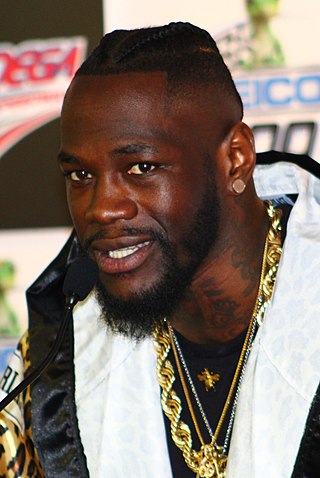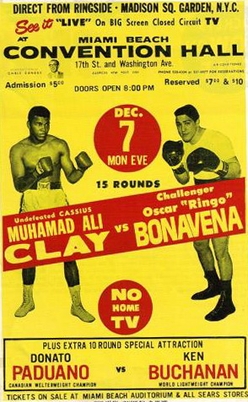
Boxing is a combat sport and a martial art in which two people, usually wearing protective gloves and other protective equipment such as hand wraps and mouthguards, throw punches at each other for a predetermined amount of time in a boxing ring.

Muhammad Ali vs. Joe Frazier III, billed as the "Thrilla in Manila", was the third and final boxing match between undisputed champion Muhammad Ali, and former champion Joe Frazier, for the heavyweight championship of the world. The bout was conceded after fourteen rounds on October 1, 1975, at the Araneta Coliseum in Cubao, Quezon City, Philippines, located in Metro Manila. The venue was temporarily renamed the "Philippine Coliseum" for this match. Ali won by corner retirement (RTD) after Frazier's chief second, Eddie Futch, asked the referee to stop the fight after the 14th round. The contest's name is derived from Ali's rhyming boast that the fight would be "a killa and a thrilla and a chilla, when I get that gorilla in Manila."

George Edward Foreman is an American former professional boxer, entrepreneur, minister, and author. In boxing, he competed between 1967 and 1997 and was nicknamed "Big George". He is a two-time world heavyweight champion and an Olympic gold medalist. As an entrepreneur, he is known for the George Foreman Grill.

Kenneth Howard Norton Sr. was an American professional boxer who competed from 1967 to 1981. He was awarded the WBC world heavyweight championship in 1978, after winning a close split decision over Jimmy Young in a title eliminator bout, after which Leon Spinks refused to fight with him.
Jimmy Young was an American heavyweight professional boxer. Young was known for his awkward, defensive style and counterpunching. He was one of the top contenders of the 1970s, most notably earning a victory over George Foreman in 1977 and losing a unanimous decision against Muhammad Ali in 1976. Young fought many significant fighters of his era, including twice outpointing Ron Lyle and losing only by a split decision to then-number one contender Ken Norton in a title eliminator in late 1977. A fellow boxer, Bobby Watts, was his cousin.

Earnie Dee Shaver, best known as Earnie Shavers, was an American professional boxer who competed between 1969 and 1995. A two-time world heavyweight championship challenger, he is known as one of the hardest punchers in heavyweight boxing history. He scored 70 knockout wins, including 23 in the first round, for a 76.7% overall knockout rate.

Ronald David Lyle was an American professional boxer who competed from 1971 to 1980, and in 1995. He challenged unsuccessfully for the world heavyweight championship, losing to Muhammad Ali in 1975. Known for his punching power, crowd-pleasing fighting style, and his courage and determination in the ring, Lyle defeated Buster Mathis, Oscar Bonavena, Jimmy Ellis, Vicente Rondón, Earnie Shavers, Joe Bugner, Gregorio Peralta and Scott LeDoux, but is best known for his fight against George Foreman in 1976, which was voted Fight of the Year by The Ring magazine.
Jerry Quarry, nicknamed "Irish" or "The Bellflower Bomber", was an American professional boxer. During the peak of his career from 1968 to 1971, Quarry was rated by The Ring magazine as the most popular fighter in the sport. His most famous bouts were against Muhammad Ali. He is often seen as being one of the Best Heavyweight Boxers never to be Champion. He beat Heavyweight Champion Floyd Patterson and top contenders Ron Lyle, Earnie Shavers, Brian London, Thad Spencer, Buster Mathis, Randy Neumann, Jack Bodell, Mac Foster and Eduardo Corletti. He accumulated damage from lack of attention to defense against larger men at the top level, no head guard sparring, and attempted comebacks in 1977, 1983 and 1992 resulted in Quarry developing an unusually severe case of dementia pugilistica.

The two fights between Muhammad Ali and Sonny Liston for boxing's World Heavyweight Championship were among the most controversial fights in the sport's history. Sports Illustrated magazine named their first meeting, the Liston–Clay fight, as the fourth greatest sports moment of the twentieth century.

Marvin Hagler vs. Thomas Hearns, was a world middleweight championship boxing match between undisputed champion Marvelous Marvin Hagler and challenger Thomas Hearns, the WBC super welterweight champion, who had gone up in weight for the bout. Won by Hagler by third-round knockout, the fight is considered by some to be the greatest three rounds in boxing history, due to its constant action, drama, and violent back-and-forth exchanges.

Diego "Chico" Corrales Jr. was an American professional boxer who competed from 1996 to 2007. He was a multiple-time world champion in two weight divisions, having held the IBF super featherweight title from 1999 to 2000; the WBO super featherweight title in 2004; the WBO lightweight title from 2004 to 2006; and the WBC, Ring magazine, and lineal lightweight titles from 2005 to 2006.

Deontay Leshun Wilder is an American professional boxer. He held the World Boxing Council (WBC) heavyweight title from 2015 to 2020. By winning the title, Wilder became the first American world heavyweight champion since 2007, which was the longest period of time in boxing history without an American heavyweight champion.

Miguel Cotto vs. Antonio Margarito, billed as "The Battle", was a professional boxing match between WBA welterweight champion Miguel Cotto and former IBF and WBO welterweight champion Antonio Margarito. The WBA welterweight title bout took place on July 26, 2008, at the MGM Grand in Paradise, Nevada, and resulted in an eleventh round technical knockout victory for Margarito.

George Foreman vs. Joe Frazier II, billed as "Battle of the Gladiators", was a professional boxing match contested on June 15, 1976, for the NABF heavyweight championship.
Muhammad Ali and Henry Cooper fought two boxing matches with each other in London. Their first match took place on 18 June 1963 and the second on 21 May 1966. Ali won both matches. The first fight was stopped by the referee in the fifth round, and the second in the sixth round. Both fights were stopped after Cooper started bleeding excessively from a cut to the left eye. The first Ali-Cooper bout is remembered for being one of the four fights in which Ali was officially knocked down in the ring by his boxing opponent, as well as leading to the mandate that ringside handlers always have an extra pair of boxing gloves available.
Muhammad Ali vs. Earnie Shavers was a professional boxing match contested on September 29, 1977, for the undisputed heavyweight championship.
Muhammad Ali vs. Jean-Pierre Coopman was a professional boxing match contested on February 20, 1976, for the undisputed heavyweight championship. Ali won the fight after knocking out Coopman in the fifth round.

Muhammad Ali vs. Oscar Bonavena was a professional boxing match contested on December 7, 1970, for the NABF and Lineal heavyweight championship at Madison Square Garden in New York City on December 7, 1970.
Cassius Clay fought Argentine Alex Miteff in a ten-round boxing match in Louisville on October 7, 1961. Clay won the fight through a technical knockout when the referee stopped the fight in the sixth round. Miteff and Clay would feature in the 1962 film Requiem for a Heavyweight.

Muhammad Ali was a boxer who mastered the rope-a-dope fighting technique. He is widely regarded by many boxing commentators and historians as the greatest heavyweight boxer of all time. Boxing magazine The Ring named him number one in a 1998 ranking of greatest heavyweights from all eras. In 1999, The Associated Press voted Ali the number one heavyweight of the 20th century.













